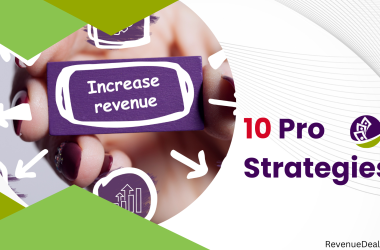If you are starting in affiliate marketing, one of the first things you will want to understand is what a revenue share is.
Revenue share is a term used in affiliate marketing that refers to how much of the sales commission earned by the affiliate goes to the publisher or agent. Revenue sharing can be a percentage or fixed amount. You generally receive a revenue share if you are an affiliate for someone else’s product or service.
To explain further, Revenue has drafted a comprehensive guide that will help you understand what revenue share is?
So without any further delay, let’s begin the guide from the beginning.
What Is The Meaning Of Revenue Share In Affiliate Marketing?
Revenue share is a commission structure in which a webmaster or affiliate receives a percentage of the total revenue generated by a customer who has referred that customer to the webmaster or affiliate.
In other words, the referral earns revenue share from their sales to the referred customer. Revenue share is one of the most common commission structures employed by online marketers and can benefit both parties involved.
For the affiliate, it offers them an opportunity to earn a more significant commission than they would receive if they were solely responsible for converting traffic into sales. And for the webmaster, it incentivizes affiliates to promote their site and generate leads through referrals.
While there are many variations of revenue share, some general rules apply. Typically, affiliates will be paid based on how much traffic they generate and how long that traffic stays on the affiliate’s website.
There are pros and cons to revenue sharing. On the one hand, it can give affiliates a reliable income stream without working too hard. On the other hand, it can create incentives for affiliates to push products instead of focusing on customer service.
How Does A Revenue Share Work In Affiliate Marketing?

In affiliate marketing, a revenue share is an agreement between an affiliate and the advertiser in which the affiliate receives a portion of the advertiser’s sales. Revenue sharing can be voluntary or involuntary.
Voluntary revenue sharing occurs when an affiliate agrees to receive a percentage of the advertiser’s sales, typically as part of a sponsorship agreement or through other forms of the contractual arrangement. Involuntary revenue sharing occurs when an affiliate is paid regardless of whether they generate sales for the advertiser.
When voluntary revenue sharing is in place, it can help ensure that both parties are profit-sharing partners. If one party is solely responsible for generating profits and losses, it can create tension and conflict within a partnership. By having both parties share in profits and losses, both sides are more likely to remain committed to the long-term success of the relationship.
Let me give you a simple example to make it easy to understand. Suppose an affiliate generates $100 in sales from a campaign that costs $200 to run. The affiliate would receive a revenue share of $40 ($40 represents 40% of the sales price).
Revenue sharing can be advantageous for both parties involved. Affiliates receive a direct payment for their efforts, and advertisers avoid paying commissions on all sales.
How Is Revenue Calculated In Affiliate Marketing?
In affiliate marketing, revenue is calculated by taking a commission on sales generated by the affiliate’s links. Commission rates can vary significantly from one affiliate program to another and from one product category to another.
In general, the higher the commission rate, the greater the percentage of commission that will be paid to the affiliate. Several factors can influence commission rates, including the type of products being sold and the size of the market represented by the affiliate program.
The basic formula for calculating a revenue share is: (revenue – the cost of acquisition) / total affiliates.
Why Revenue Share Is Important For Affiliates

Revenue share is essential for affiliates because it allows them to earn a commission on sales without spending a lot of time promoting or selling the product. Affiliates can also make money from services such as lead generation and web traffic generation.
When an affiliate marketer is working to bring in new customers, they are always looking for ways to improve their chances of success. One way to do this is by increasing the affiliate’s revenue share.
Revenue share is the percentage of the sale that the affiliate receives. It can be a significant factor in determining the success or failure of an affiliate marketing campaign. Here are a few reasons why affiliates need a revenue share:
1. Affiliates help promote the parent company’s products and services.
2. Affiliates can help generate new leads and customers for the parent company.
3. Affiliates can help the parent company build brand awareness and credibility within their target market.
4. Affiliates can help increase sales within the parent company’s existing customer base.
5. Affiliates can provide valuable feedback to the parent company about improving its products and services.
6. The affiliate relationship is an essential source of long-term value for both parties involved, which builds trust and mutual respect between affiliates and their respective companies.
Top Benefits Of Revenue Share

Do you want to become a partner in the revenue share model but are still confused about why you chose it? No worries, because now Revenue experts will give you some of the appealing reasons you should select the Revenue share model of Revenue dealer.
Shared Success
You should choose our revenue share model for your business for a few reasons. Shared success is one of the essential factors in any industry. A revenue-sharing investment offers an aligned structure, where managers prioritize sustainable growth for shareholders. Shareholders share success as well.
When both parties benefit from the company’s success, it leads to less conflict and better communication. Furthermore, when each party is incentivized to contribute their best effort, the company will be more successful overall.
Revenue sharing also helps companies save money on overhead costs. By dividing up the profits, companies can avoid high administrative costs and focus on their primary goal: making money.
Fixed Interest > Percentage of Revenue
Instead of a typical interest rate structure where a fixed consideration is charged, revenue sharing takes the idea of gross earnings of a significant investment. Because of this, if your company has a slower revenue month, your revenue isn’t affected as much.
Remain in Command
A revenue-sharing agreement allows entrepreneurs to retain full ownership of their company. When the Repayment Cap is met, there is no longer an obligation to repay future revenue to an investor. The business owner retains full ownership and control over the company’s direction.
Prospective Investment
As a result of the focus on revenue, investment in a startup is wide open, as companies are evaluated based on their capacity to realistically generate revenue. This makes it possible for startups to have a higher chance of receiving funding.
And makes it easier for companies to expand their businesses in an organized fashion instead of pursuing extreme growth in share price.
Removes The Complexity
Equity sharing makes it challenging to ascertain a company’s success or investment. Capital providers are fully responsible for the company’s progress instead of its owners. As a result, shareholders face a more straightforward chance to create and take pleasure in their company’s growth while maintaining fees under control.
With an established allocation of resources and focus on higher levels of growth, growth metrics are more straightforward to recognize and quantify.
Possession of Data
Content producers know that user data is a desirable source of revenue in addition to content. It is common knowledge that user data drives distribution because it plays a crucial role in monetization. Therefore, more structured user data can drive higher CPMs and improved performance.
At Revenue, we allow data associated with the account to be viewable only by the publisher. Options are provided to clients to export and delete data from their accounts.
- Hosts can use the Audience database to easily export or erase data about their users from the platform.
- Update all parties on requests made to export or delete such data while ensuring nothing is overlooked.
- Prepare and thoroughly test a contract to ensure that it is GDPR-compliant.
Incentives are limited
When revenue-sharing platforms are designed to meet the demands of mass culture, publishers tend to suffuse the platform with valuable content to not be as diverse as others trying to succeed there.
They do not devote sufficient attention to the kind of content relevant to a particular publisher since they focus on content that will interest a large audience rather than the content behind a specific publisher.
The difficulty is how to get a competitive edge in this situation? It’s hard for a content publisher to develop its unique UX without the need for the content provider’s existing product strategy.
Moreover, the more you earn from advertisement platforms, the more revenue sharing revenue model makes. So, as a publisher, you give up the control of your earnings to a third party when you’re profit-sharing.
Revenue sharing models often lock in a publisher to using a small set of features offered by the RSP, with little opportunity to influence its roadmap.
As Revenue, we furnish a user-friendly customer relationship management system. We supply the paywall to get information on sequential and comparative insights regarding your target audience. We have designed several templates, including ways to help you create churners and VIP customers of your revenue.
How Do Affiliates Generate Revenue?

Affiliates are a valuable marketing tool for businesses of all sizes. Their role is to bring in new customers by promoting products and services on their behalf. In exchange for promoting the company, affiliates typically receive a commission (a percentage of sales) or payment based on the number of visitors they send to the business. Some affiliate programs provide further benefits such as access to exclusive content, training, and support.
There are several ways affiliates generate revenue. Some affiliates receive a commission on sales, while others may receive a percentage of the total payout.
Others may be offered membership in a program that gives them access to bonus products or discounts. Still, others may receive rental fees, donation links, or other forms of compensation for referring customers to the advertiser’s product or service.
The most common way is through commissions earned from sales made through their links or ads. Other methods include:
- Charging fees for services provided (such as lead generation).
- Providing gifts or vouchers to customers.
- Running competitions.
Most affiliate programs have rules about what can and cannot be sold through links or ads. This is important because it helps protect the business and the affiliates from any legal issues.
Final Verdict
In conclusion, a revenue share in affiliate marketing is when a website or online merchant pays an affiliate for each sale that the affiliate creates. The percentage spent on the affiliate can vary, but generally, it is a percentage of the sale price. This can be an excellent way for affiliates to earn a commission without spending a lot of time promoting or managing their campaigns.
If you want to become a successful affiliate and earn maximum revenue, then contact us right now.
Frequently Asked Questions
Q: Is revenue sharing good?
A: This model has pros and cons, so it’s essential to consider each before deciding. The benefits of revenue sharing are that it can help companies get more out of their partnerships. Having partners who believe in your mission can give you an edge when attracting new customers or investors. However, One issue is that it can create tensions between companies and their partners.
Q: Is revenue share an expense?
A: Revenue share is a typical arrangement in which a company pays its partners a percentage of the company’s revenue. Some argue that this arrangement is an expense, while others contend that it is an investment in the partnership’s success. Is revenue share a cost?
Q: Is revenue sharing taxable?
A: Many people believe that revenue sharing is a form of tax evasion, while others argue that it is simply a way for companies to share profits equitably. In many cases, whether revenue sharing is taxable depends on the specific situation.
Q: What are the advantages and disadvantages of revenue sharing?
A: There are a few advantages and disadvantages to revenue sharing. Benefits include that it can be a way to share profits more equitably among group members, and it can help build trust between parties. Disadvantages may consist that revenue sharing can lead to division and resentment among group members and that it can be challenging to determine who should receive what share of the revenue. Ultimately, whether or not to implement revenue sharing will depend on the specific circumstances and needs of the group in question.
Q: Is revenue sharing legal?
A: Revenue sharing is a business model in which businesses share revenues. In some cases, this sharing may be voluntary, while in others, it may be required by law. Legal concerns can arise from revenue sharing, including the exploitation of employees, antitrust issues, and tax implications. Understanding the terms and conditions of any agreement involving revenue sharing is essential before signing on the dotted line.









